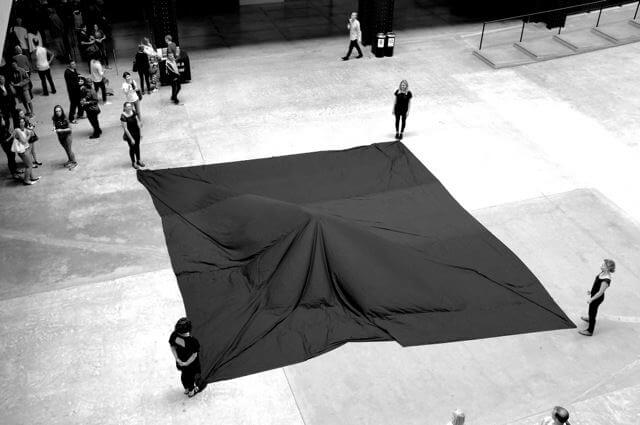Press release: Tate to go back to court over BP secrecy
-
Tate accused of using technicalities to keep BP sponsorship fees secret.
-
Art museum believed to be reviewing BP deal this year, ahead of potential renewal.[1]
-
Hearing scheduled for 11 May 2016. Please contact for details.
Contact: Anna Galkina, Platform / @platformlondon / [email protected]
Tate is to appear at the Information Tribunal in May, over refusal to reveal sponsorship fees BP paid to Tate between 2007-2011. London arts group Platform, represented by law firm Leigh Day and Monckton Chambers, and supported by information rights group Request Initiative, are taking the appeal forward.
Tate was previously forced to reveal that BP fees accounted for under 0.5% of Tate’s budget between 1990-2006 (£150,000-£330,000 a year).[2] In its judgment the Information Tribunal made clear that Tate should disclose historic sponsorship figures. But now Tate is refusing to disclose the figures for 2007 to 2011, despite the fact that they are now also historic.[3]
“Arts sponsorship is a coldly calculated strategy by oil companies to gain the public trust they desperately need to go on drilling for more fossil fuels, wrecking human lives and our climate. That public trust is what Tate is providing to BP. Instead of fumbling for a technical reason to keep sponsorship details secret, Tate should right now be making plans to break free of BP’s brand.”
Brendan Montague of Request Initiative said,

“BP gets huge recognition from branding some of Britain’s finest art with its logo. But it is the taxpayer who foots most of the bill for the gallery – and the public should be informed through the FOIA how much BP is paying the gallery for its sponsorship.”
Documents released last year showed that Tate’s Ethics Committee believed “the reputational risk to Tate of retaining BP as a partner [was] significant”. But before the Tribunal, Tate’s lawyers argued that disclosure would offend BP, and also lead to further protests, posing a “health and safety risk”. The Information Tribunal rejected these arguments.
Lawyer Rosa Curling of Leigh Day said,
“It is clearly in the public interest for Tate to disclose details about its 2007-2011 sponsorship deal with BP. Tate has previously tried to prevent details about its sponsorship deals becoming public, and the Information Tribunal found this to be unlawful. It is regrettable that Tate does not seem to have learnt from its mistakes in past and again, at public and its membership expense, is forcing our client to seek intervention from the Information Tribunal.”
Pressure has been mounting for Tate and other museums to end their relationships with BP. The art collective Liberate Tate responded to Tate’s secrecy over BP with two performances. Hidden Figures used a huge square of black fabric to hide performers’ bodies, alluding to redactions in Tate’s documents as well as to Malevich’s Black Square exhibited in Tate at the time.[4] In The Reveal, Liberate Tate threw thousands of specially printed “bank notes” bearing the faces and signatures of Tate director Nicholas Serota and BP’s ex-CEO, Tate Chair of Trustees John Browne, through the air in Tate Britain’s rotunda hallway.[5] In December, artists, performers, and academics took over spaces inside Tate Modern for Deadline Festival (curated by Platform) – an unauthorised cultural festival marking one year before the end of Tate’s current deal with BP.[6]
British Museum and the National Portrait Gallery both previously voluntarily disclosed recent or current amounts that BP paid them as sponsor [7].
Notes
[1] Tate Director Nicolas Serota has confirmed the BP relationship with be reviewed by the Tate Board of Trustees this year ahead of any renewal of it sponsorship with BP for when the present deal expire in February 2017. Lionel Barber, editor of the Financial Times, now chairs the Tate Ethics Committee and has responsibility for the BP review and recommendation that emerges.
[2] https://platformlondon.org/p-pressreleases/tate-forced-to-reveal-bp-sponsorship-details/
[3] The previous Tribunal considered that the 2006-2011 figures were sufficiently recent at the time they were originally requested – in 2012 – that their release could have harmed Tate’s commercial interests. Campaigners argue that in 2015 (and now in 2016), these figures are no more likely to harm Tate’s interests than the figures from 2006. This accords with the reasoning of the Tribunal in its judgment where it drew a distinction between: (a) current and recent figures (assessed as at the time of the request; and (b) historic figures.
[4] https://www.artnotoil.org.uk/hidden-figures
[5] https://www.youtube.com/watch?v=2MTwVpKci9o
[7] The National Portrait Gallery disclosed the fees for an ongoing BP sponsorship deal (£1.25m over five years) in response to a FOI request in 2008.
British Museum disclosed BP sponsorship fees up to 2011 in response to a FOI request in 2015.